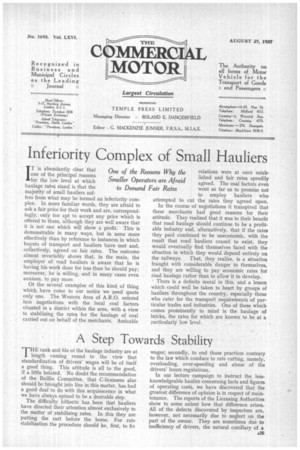Inferiority Complex of Small Hauliers
Page 27

If you've noticed an error in this article please click here to report it so we can fix it.
IT is abundantly clear that one of the principal reasons for the low level at which haulage rates stand is that the majority of small hauliers suffers from what may be termed an inferiority complex. In more familiar words, they are afraid to ask a fair price for their work and are, correspondingly, only too apt to accept any price which is oftered to them, although they are well aware that it is not one which will show a profit. This is demonstrable in many ways, but in none more effectively than by reference to instances in which buyers of transport and hauliers have met and, collectively, agreed on fair rates. The outcome almost invariably shows that, in the main, the employer of road hauliers is aware that he is having his work done for less than he should pay; moreover, he is willing, and in many cases even anxious, to pay more.
Ot the several examples of this kind of thing which have come to our notice we need quote only one. The Western Area of A.R.O. entered into negotiations with the local coal factors situated in a district within the area, with a view to stabilizing the rates for the haulage of coal carried out on behalf of the merchants. Amicable relations were at once established and fair rates speedily agreed. The coal factors even went so far as to promise not to employ hauliers who, attempted to cut the rates they agreed upon.
In the course of negotiations it transpired that these met chants had good reasons for their attitude. They realized that it was to their benefit that road haulage should continue to be a profitable industry and, alternatively, that if the rates they paid continued to be uneconomic, with the result that road hauliers ceased to exist, they would eventually find themselves faced with the situation in which they would depend entirely on the railways. That, they realize, is a situation fraught with considerable danger to themselves, and they are willing to pay economic rates for road haulage rather than to allow it to develop.
There is a definite moral in this, and a lesson which could well be taken to heart by groups of hauliers throughout the country, especially those who cater for the transport requirements of particular tades and industries. One of these which comes prominently to mind is the haulage of bricks, the rates for which are known to be at a particularly low level.




















































































